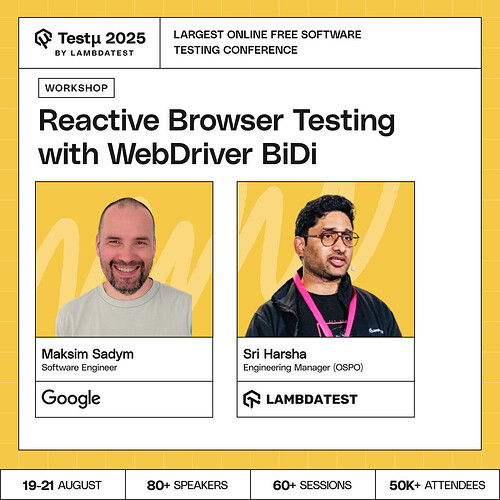Join Sri Harsha (Engineering Manager, LambdaTest) and Maksim Sadym (Google) as they explore WebDriver BiDi, the next evolution in browser automation.
Learn how to set up BiDi sessions, capture real-time browser events, and build reactive, event-driven test flows that reduce flakiness and accelerate feedback.
Discover practical patterns for reactive test design, guidance on migrating existing tests, and curated resources to implement BiDi effectively in your automation workflows.
 Don’t miss out, book your free spot now
Don’t miss out, book your free spot now
Can BiDi sessions be integrated with existing test frameworks? (Selenium, Playwright, Cypress)
Is WebDriver BiDi going to replace the Chrome DevTools Protocol (the CDP)? If not, how do their roles differ in the context of reactive testing?
How does WebDriver BiDi compare to using browser-specific devtools protocols (like Chrome DevTools Protocol)?
Now that we’ve seen how BiDi ‘listens’ for events, how does this fundamentally change our approach from the ‘polling’ or ‘ask-and-wait’ model of WebDriver Classic?
With WebDriver BiDi enabling real-time event streams from the browser, how can AI be leveraged to dynamically adapt test flows, for example, automatically responding to unexpected network failures, console errors, or DOM changes during execution?
What are the key advantages of using WebDriver BiDi for reactive testing when considering aspects like maintainability and adaptability to browser changes?
How does switching to BiDi’s real-time event listening change the testing strategy compared to WebDriver Classic’s ask-and-wait model?
How does WebDriver BiDi make browser testing easier compared to older methods?
In what ways does BiDi’s event-driven “listening” model alter our testing strategy compared to WebDriver Classic’s traditional polling or request-response style?
What are the advantages of using WebDriver BiDi for cross-browser testing compared to browser-specific protocols like CDP?
WebDriver BiDi enables bidirectional communication between browsers and automation tools. How does this paradigm shift enable reactive testing, where tests respond dynamically to browser events instead of rigidly controlling every step?
How does reactive browser testing differ from traditional scripted browser automation?
What new debugging workflows become possible with BiDi compared to WebDriver Classic?
Could AI decide, in real time, whether to continue, pause, or reroute a test when BiDi streams show anomalies, effectively creating ‘self-governing’ tests?
Which IDE we need to use for this workshop ?
Does this supported by Visual code and eclipse IDE ?
Is AI the new intern or the future test lead?
Can BiDi be used with native test automation frameworks like espresso and xcuitests?
How can BiDi help unify testing and monitoring by streaming live browser state instead of post-test logs?
![]() Don’t miss out, book your free spot now
Don’t miss out, book your free spot now